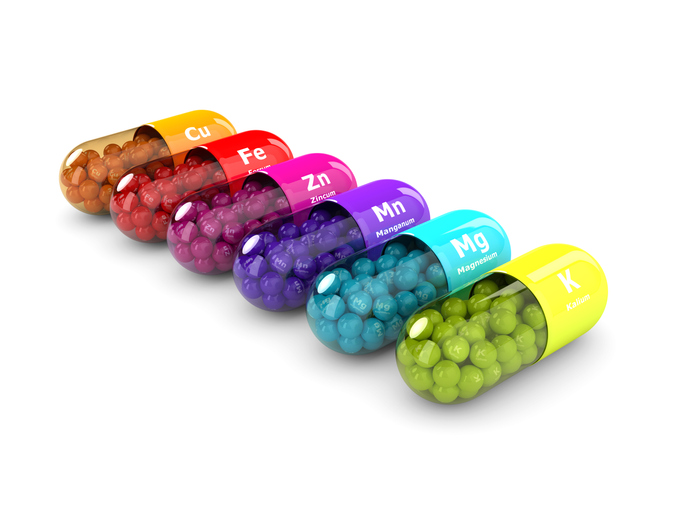Vitamin and Mineral Megadosing & COVID-19

There are six groups of nutrients we need to stay healthy:
The last two items on this list (vitamins and minerals) are sometimes referred to as micronutrients. Some examples of important micronutrients include zinc, iron and vitamins, A, C and D.
“Micronutrients, often referred to as vitamins and minerals, are vital to healthy development, disease prevention, and wellbeing. Although only required in small amounts, micronutrients are not produced in the body and must be derived from the diet,” reports the Centers for Disease Control and Prevention (CDC).

As we battle COVID-19, the importance of strengthening the immune system cannot be overstated. It’s important to eat a micronutrient-rich diet (which includes fruits and vegetables) in order to help the body’s immune system fight off harmful bacteria and viruses.
The reality, however, is that so many of us have micronutrient deficiencies. This is due to a number of reasons, including the following:
- Poor quality diet (for example, a diet rich in ultra-processed foods)
- Older age (with older age, it is more difficult for the body to efficiently use nutrients from food)
- Drinking excess alcohol (alcohol depletes the body of vitamins and minerals)
- Smoking (lowers vitamin C levels in the body)
- Medications (may also depete the body of certain micronutrients such as vitamin B).
Some people may also just have genetic predispositions to certain micronutrient deficiencies. For example, I am prone to having low vitamin C levels despite maintaining a diet rich in fruits and veggies.
Given the circumstances which may cause micronutrient deficiencies, many people will have no choice but to turn to some form of micronutrient supplementation. And the best time to implement supplementation is after testing. Nutrient tests can tell us what our nutritional needs are and allows us to address any deficiencies or excesses by seeking the advice of a competent healthcare professional to rectify the imbalance.
Supplements are usually available at local health stores as well as grocery stores, but you want to make sure you are selecting good quality supplements which are prepared using credible scientific research. You should also ensure that you comply with proper instructions about how to take them so you can properly address deficiencies. (Proactive Health Labs approved sources for supplements can be found here and here).
You may also want to avoid micronutrient megadosing without the input of a competent medical professional. Megadosing means taking more than the recommended amount of a certain micronutrient. Vitamins and minerals are great for us, but in many cases more doesn’t always mean better.
“Megadoses of the fat-soluble vitamins A, D, E, and K can cause problems, and even some standard doses may interfere with certain prescription medicine. Some people may experience adverse effects from too much calcium or iron,” according to one source.
Adrian Gombart, a researcher from Oregon State University’s Linus Pauling Institute and a few other researchers from reputable medical institutions around the world say that administering high amounts of micronutrients to people is key in the fight against COVID-19.
“Supplements containing vitamins C and D and other micronutrients, sometimes in amounts exceeding the federally recommended levels, are a safe, effective and low-cost means of helping your immune system fight off COVID-19 and other acute respiratory tract diseases,” according to one report that summarizes Gombart’s position.
In New York, one of the epicenters of the coronavirus in the United States, some hospitals give “seriously sick” coronavirus patients “massive doses of vitamin C,” according to one report.
A doctor mentioned in the report says that COVID-19 patients in intensive care get 1,500 milligrams of intravenous vitamin C. (To learn more about IV vitamin therapy, read here).
This dose is 16 times higher than the National Institute of Health’s daily recommended dietary allowance of vitamin C.
“The patients who received vitamin C did significantly better than those who did not get vitamin C,” said the doctor.
“It helps a tremendous amount, but it is not highlighted because it’s not a sexy drug.”
To be clear, this does not mean that vitamin C will completely prevent or cure COVID-19. This is evidence, however, suggesting that this vitamin may help to reduce the effects of viruses such as coronavirus.
Gombart and the other researchers mentioned earlier say that public health officials need to deliver the message that good nutrition plays a major role in supporting the immune system.
Along with vitamin C, Gombart says that vitamin D, zinc and an omega-3 fatty acid found in fish called docosahexaenoic acid (DHA) are imperative for a strong immune system.
“The problem is that people simply aren’t eating enough of these nutrients. This could destroy your resistance to infections. Consequently, we will see an increase in disease and all of the extra burdens that go along with that increase,” Gombart said.
This is why scientists and researchers are recommending that we take more than a daily multivitamin to stay healthy during these times when there is a greater need to protect our bodies from viruses and infections. Doses of "200 milligrams or more of vitamin C (higher than the suggested federal guidelines of 75 milligrams for men and 50 for women) and 2,000 international units of vitamin D, rather than the 400 to 800" are recommended depending on age.
You always want to get the advice of a competent healthcare professional when it comes to taking any kind of medication or supplement. And to reiterate, if you are already taking prescription medications, be aware that certain supplements may interact with your medications.
If you are concerned about coronavirus and your health, talk to your doctor about micronutrient megadosing and see if this is a viable option for you. (A comprehensive scientific analysis can be found here).
Perhaps, the main takeaway from all this is that addressing our micronutrient deficiencies and imbalances' especially during thie pandemic, is important.
For tips on how you can shop and eat healthily during this pandemic, check out this pH Labs blog.
Finally, remember to test when it comes to evaluating your nutritional status. Routine nutrient tests will identify any nutritional imbalances so you can replace lost nutrients by diet or IV vitamin drips or injections. These are credible ways to boost your immunity and reduce any potential damages from COVID-19.
Protect your healthy life!
The pH professional health care team includes recognized experts from a variety of health care and related disciplines, including physicians, attorneys, nutritionists, nurses and certified fitness instructors. This team also includes the members of the pH Medical Advisory Board, which constantly monitors all pH programs, products and services. To learn more about the pH Medical Advisory Board, click here.







